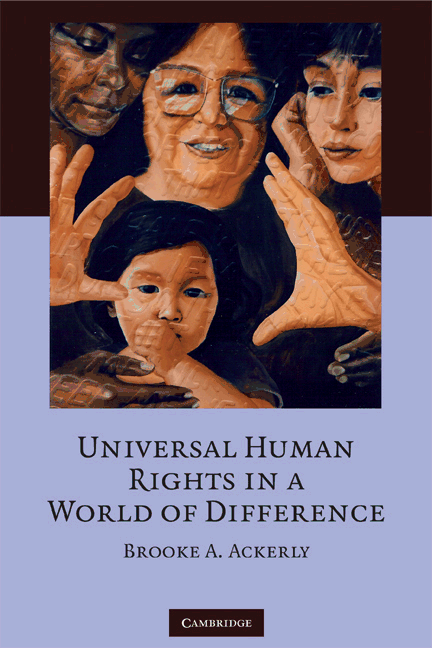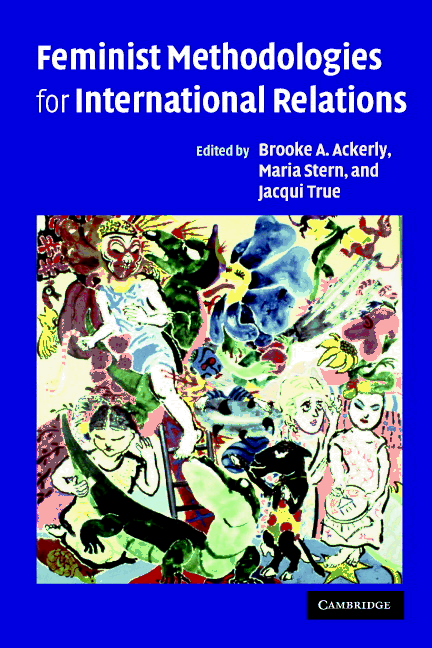In addition to numerous articles and book chapters, Professor Ackerly is the author of Doing Feminist Research with Jacqui True (Palgrave 2010), Universal Human Rights in a World of Difference (Cambridge 2008), and Political Theory and Feminist Social Criticism (Cambridge 2000). She has also edited, with Maria Stern and Jacqui True, Feminist Methodologies for International Relations (Cambridge 2006).
She works collaboratively on feminist theory and evaluation with feminist colleagues at Vanderbilt and other institutions through the Global Feminisms Collaborative, on environmental justice with Vanderbilt colleagues, Michael Vandenberg, Steve Goodbred, and Jonathan Gilligan, and on methodology with Lyndi Hewitt, Jacqui True, Anna Carella, and Ying Zhang.
Professor Ackerly also contributes to the on-going Human Rights & Human Welfare Roundtable discussions, “a forum for its panelists to express opinions of and insights into pressing international concerns,” by writing on human rights, global justice, “failed states”, and military action in places such as the Ivory Coast and Guatemala.
View and download Professor Ackerly’s CV.
–Professor Ackerly’s Published Books–

With Jacqui True, Doing Feminist Research in Political & Social Science, Palgrave 2010.
View the Companion Website to the book for helpful resources.
“A splendid book which provides a clear and careful guide to doing and evaluating feminist research and highlights its crucially transformative role in the social sciences. It should be required reading not just for every social science – and of course feminist – methods course but for all researchers, reviewers and gatekeepers too.” —Sandra Harding, UCLA
“Methodologically diverse and theoretically rich, an important and accessible guide for doing feminist research that deserves to be read by scholars from all social scientific traditions.” —J. Ann Tickner, University of Southern California
“This timely, accessible and practical guide to doing feminist research will be welcomed by students and researchers across the social sciences.” —Nira Yuval-Davis, University of East London, UK

Universal Human Rights in a World of Difference, Cambridge University Press 2008
"As an activist I find Ackerly's theorizing of human rights in action so insightful. She gives a name to our approach - curb-cut feminism: by being humble and attentive to those made invisible or 'different' by the mainstream we are better able to realize universal human rights. This book is a very useful map for anyone committed to justice in an often messy terrain." --Joanna Kerr, Former Executive Director of AWID, the Association for Women's Rights in Development
"A stunning achievement. Ackerly takes up the daunting - some would say insuperable - challenge of developing a universal theory of human rights that does not entail cultural imperialism. With the concerns of activists and politics of difference as her starting points, she thinks outside the box that has limited our understanding of, and ability to realize, universal human rights. This extremely thoughtful and closely argued text will stimulate debate and, I hope, revitalize activism." --V. Spike Peterson, Department of Political Science, University of Arizona

With Jacqui True, Feminist Methodologies for International Relations, Cambridge University Press, 2006.
"...Feminist Methodologies for International Relations is, overall, a thoroughly satisfying book that manages to integrate a diverse range of feminist IR scholarship without forcing it into a straitjacket. It is an important teaching tool, showing the rigor of feminist methods and providing helpful guideposts to those who venture onto the terrain of feminist international relations."
Elisabeth Prugl, Florida International University, International Studies Review
"This edited volume is instructive in illuminating feminist methodologies and in highlighting the insights gained from them, and in many ways it provides useful cultural insights into the orientations and practices of feminist IR scholars. It tackles a difficult topic and should serve as a catalyst for further debate. Ackerly, Stern, and True make a sizable contribution in providing insight into feminist methodologies and concerns and encouraging the reader to assess her own biases; to question 'knowledge,' discipline boundaries, and definitions; to identify assumptions and exclusions; and to recognize the necessity of including gender in research-it is tempting to include the phrase 'where relevant,' though the authors do make a solid argument that gender is always relevant."
Mary Caprioli, University of Minnesota - Duluth, International Relations

Political Theory and Feminist Social Criticism, Cambridge University Press, 2000.
“[Ackerly’s] effort to fuse political theory with observation of and reflection on grassroots practice in the global South should be emulated and expanded. Some of the most important claims of justice today come from vital social movements in that part of the world, and it is high time that political theorists interested in issues of democratic process and social criticism incorporate the experience of these movements into their theoretical world.” - Iris Marion Young, University of Chicago in the American Political Science Review
In Political Theory and Feminist Social Criticism, Brooke Ackerly demonstrates the shortcomings of contemporary deliberative democratic theory, relativism and essentialism for guiding the practice of social criticism in the real, imperfect world. Drawing theoretical implications from the activism of Third World feminists who help bring to public audiences the voices of women silenced by coercion, Brooke Ackerly provides a practicable model of social criticism. She argues that feminist critics have managed to achieve in practice what other theorists do only incompletely in theory. Complemented by Third World feminist social criticism, deliberative democratic theory becomes critical theory - actionable, coherent, and self-reflective. While a complement to democratic theory, Third World feminist social criticism also addresses the problem in feminist theory associated with attempts to deal with identity politics. Third World feminist social criticism thus takes feminist theory beyond the critical impasse of the tension between anti-relativist and anti-essentialist feminist theory.